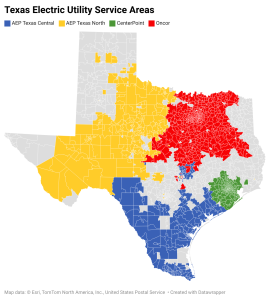Solar panel offset refers to the portion of a household's electricity consumption that is covered or "offset" by the energy generated from their solar panels in a calendar year. It is a measure of how much of your energy usage is replaced with solar power, reducing your reliance on grid electricity and, therefore, your electricity bills.
Ex. A 100% offset means your solar panels produce as much electricity as you consume over a given period. You will have two separate bills when you are on a solar buy back plan. One bill will be the the utility company and the second one will be for the solar panels. Your TDU is based on your location. Major TDUs in Texas include Oncor, CenterPoint, AEP Texas, and TNMP. Check your electricity bill for TDU details or visit the Electric Reliability Council of Texas (ERCOT) website or ask your PowerMax Energy broker.
A Transmission and Distribution Utility (TDU) delivers electricity from power plants to your home or business and maintains the poles, wires, and meters. Everyone will pay metering fees whether you are traditional or solar. No, not all providers offer buy-back programs, so it’s important to research which providers support solar customers. Yes, many homeowners choose to install battery storage systems to store excess energy for use during non-sunny hours or outages. Yes, but it depends on your current contract with your retail electricity provider. Please note that credits from one REP plan to another do not transfer and in most cases have no monetary value. Not always. Some plans offer lower rates for buy-back than what you pay for energy consumption. Yes, you need a bi-directional meter to measure both the energy you use and the energy you send back to the grid. Rates vary by provider and plan, often between $0.07 and $0.12 per kWh (at the time of publication). Texas does not have statewide net metering, but many utilities and retail electric providers offer solar buy-back programs that credit customers for excess generation. A solar buy-back plan allows you to sell excess electricity generated by your solar panels back to the grid. Yes, many financing options, including solar loans, leases, and power purchase agreements (PPAs), are available. Payback periods in Texas typically range from 8-12 years, depending on electricity rates and system size. The amount depends on your system size, location, and weather conditions, but in Texas, a typical home can generate 8,000-12,000 kWh per year. While possible, professional installation ensures compliance with local regulations and safety standards. Panels can be temporarily removed and reinstalled, but it’s best to install solar panels on a new or well-maintained roof. Solar panels have a lifespan of about 25-30 years and often come with a 20-25 year warranty. When installed properly, solar panels do not damage the roof and can protect the areas they cover. Solar panels are low-maintenance, usually needing only occasional cleaning and inspections. No, unless you have a battery backup system. Texas law limits HOA restrictions on solar panels, but it's advisable to check with them for any specific requirements. Most installations take 1-3 days, but the full process, including permitting, can take several weeks. Texas offers local rebates, but the primary incentive is the federal solar tax credit (ITC), which provides up to 30% of system costs. Costs vary but typically range between $10,000 and $30,000 before incentives. Yes, Texas receives abundant sunshine, making it ideal for solar energy systems. Solar panels capture sunlight, converting it into electricity via photovoltaic cells, then an inverter converts it for home use. Solar energy reduces electricity bills, increases home value, and reduces carbon footprint.What is solar offset?
Will I only have one electric bill now?
How do I find out who my TDU is?

What is a TDU?
Do all electricity providers in Texas offer solar buy-back plans?
Can I store excess energy with a battery instead of selling it?
Can I switch between solar buy-back plans?
Is the rate I pay for electricity the same as the rate I get for buy-back?
Do I need a special meter for a buy-back plan?
What rate will I receive for the excess electricity I generate?
How does net metering work in Texas?
What is a solar buy-back plan?
Can I finance my solar installation?
What is the payback period for solar panels?
How much energy can I expect to produce?
Can I install solar panels myself?
What happens if I need to replace my roof after installation?
How long do solar panels last?
Can solar panels damage my roof?
Do solar panels require maintenance?
Will solar panels work during a power outage?
Do I need approval from my HOA?
How long does a solar installation take?
Are there any state incentives for solar in Texas?
How much do solar installations cost in Texas?
Is Texas a good place for solar power?
How do solar panels work?
What are the benefits of solar energy?
